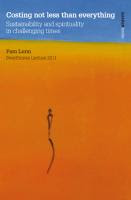Mark Kibblewhite, who was one of the contributors to the weekend, is a member of Hitchin Quaker Meeting. He is a Professor at Cranfield University and President Elect of the Institution of Agricultural Engineers; his research supports the development of policy - by Defra, the European Commission and national and international organisations - for better protection of soil resources.
Below are two short 'think pieces' he has written to help us rethink our attitude to the earth beneath our feet.
* * * * *
Who owns soil?
The idea of land as property probably emerged as soon as human beings became pastoralists and started to leave behind their hunter-gatherer cultures. And the concept of land ownership will have evolved further alongside settled agriculture and crop husbandry. However, who owns soil?
Increasingly, we are recognising that soil delivers much more than support for food, fuel and timber production. Moreover, its contribution to water and atmosphere regulation contributes to a common wealth while, conversely, soil degradation incurs costs for the whole community as well as the land owner. This suggests that at least part of the value of soil resources is in a commons. It turns out that the parallel with water resources is quite close – individuals and organisations have rights of exploitation over surface water in streams and rivers but no strict ownership and so perhaps it should be with soil resources.
Land ownership is a central tenet for our institutions and an important part of the legal framework for our society. However, we need to re-think the ownership of soil and bring it more in-line with that for waters. After all, with rights of exploitation go duties, and arguably the duties required at present in relation to soil use are inadequate – particularly if the societal goal is long-term sustainability of resources for the use of future generations.
For example, while there has been lots of focus on the impact of soil-derived sediment on aquatic habitats, the actual loss of soil resources by erosion is often just a secondary consideration in the regulatory world. Meanwhile, it could be argued that when a land owner sells land for building the common value represented by soil that is sealed is expropriated. So should land owners be required to be stewards of soil resources rather than just being 'encouraged' to take on this role? Should there be a proper national monitoring programme for soil resources, especially the most versatile and valuable ones, that provides society with objective information about the state of its soil resources?
Moving towards new regulation is not a current priority for the Government but dare we suggest that we need an OfSOIL?
* * * * *
Soil opinion - Let’s start a revolution!
Our construct of soil systems has developed rapidly in the past two decades. Now we see soil as a ‘biological engine’ that does a variety of work delivering services. Our understanding of soil biology has grown in strides and is advancing quickly. So far, however, this new knowledge has not been exploited much to deliver increased agricultural productivity.
Current agricultural productivity is inadequate to feed a mushrooming global population – better application of existing technologies, derived from advances made in the 20th century in soil chemistry, physics and the plant sciences, can still increase yields, and there is still some scope for extending the area of farmed land. Nonetheless the consensus is that we need innovative technology to increase yields dramatically. Moreover, this yield increase has to be achieved with a shrinking environmental footprint; greenhouse gas emissions from agriculture are too important to be left out of necessary global reductions, and much more efficient water use in agriculture is essential if we are to avoid urban water shortages. And our agricultural systems are reliant on oil and this commodity looks set to become increasingly costly and potentially limited as more easily exploited resources are used up.
In summary, it appears we may be approaching what has been described as a ‘perfect storm’ in our food production unless we can make a technological leap. Current agricultural technology is based on substitution of functions of the ‘biological engine’ mainly by oil-supported interventions, for example nitrogen supplied from the Haber process. This is all rather crude. It is also leaks resources, especially nitrogen. Our new knowledge of soil biology needs to be exploited to make soil a better medium for plant growth with less reliance on oil-derived inputs.
How can we manipulate soil ecosystems via carbon management? What opportunities exist for nitrogen fixation and management that remain unexploited? Are there fundamentally different designs for soil-plant systems that better exploit ecological principles? Why are we wedded to planting single crops in straight rows and would mixed cropping in regular but relatively complex ‘tile’ patterns better exploit soil biology, water resources and solar radiation?
Agricultural science and engineering has been in the doldrums for a couple of decades but fortunately biological science has been ascendant. The new biology offers prospects for a radically different soil and field management and the science and engineering communities need to grasp the present opportunity and deliver an agricultural revolution.

No comments:
Post a Comment